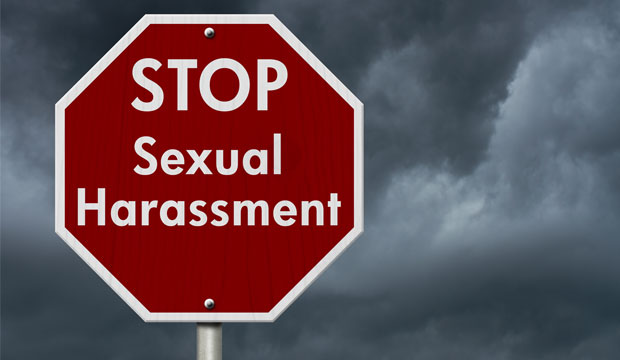
There are three groups of people involved in sexual harassment: the victims; the perpetrators/predators; and those who cover up or enable the perpetrators.
Historically, we have put more pressure on the victims -- either forcing them to shut up to protect their jobs and careers, or forcing them out of their jobs (with or without compensation), which was totally wrong.
There's been a recent move to focus on the perpetrators/predators, generally forcing an end to their careers or even shuttering of their businesses, often with massive collateral damage in terms of lost jobs for people who had nothing to do with the harassment and might even have been victims of it.
That also seems wrong, at least in part, because the penalties hurt a large number of innocent or already hurt people.
The folks I think we should be targeting far more are the enablers and cover-up artists who have been allowing what initially could have been small, correctable behavior problems to grow into career and company killers. As a result, it seems possible that behaviors that may have caused minor damage to a few initial victims were allowed to evolve into behaviors that caused major harm to hosts of victims.
If this did happen, it could be because we tend to focus way too much on blame and way too little on understanding and preventing problems like this.
Which behavior is worse -- perpetrating sexual harassment or enabling it?
A Case Against Enablers
For me, this question goes back to when I was in internal audit at IBM. I would go into an area that was out of control and often conclude that the reason it was out of control was that the function wasn't staffed or funded adequately.
Some executive nimrod would try to save costs by putting one poor sap, often a woman, into a job that typically would require a department. Without any support, her efforts wouldn't work out, and then he would hang her out to dry.
Some of the people put in those impossible positions were working 18-hour days, six or seven days a week, on salary. By any definition, it was abuse. I always wanted to go after the nimrod executive in a case like that and give the poor employee an award, but that wasn't allowed. Often the overworked employee was shot -- though not by me, because I'd refuse (didn't make for a long audit career).
As a result, I'm a big fan of looking at a problem and going to the root cause so you can put in place a process that will fix something. You see, firing overworked employees who are performing at a near-supernatural level and replacing them with other soon-to-be-shot employees doesn't fix anything. It just looks like you did something.
The same is true when removing bad-acting executives and politicians. If the enablers are still there, they will continue to enable (and they likely are enabling others). That means the harassment not only will recur, but also might be ongoing with someone else at the very moment of firing the politician or executive who was unlucky enough to get caught.
However, if you fire the enablers, then you send a message that enabling this behavior also is a career-ending practice, and you'll likely get more support for the victims and have a better chance of catching and correcting the bad behavior early.
If you catch it early, then you might end up with just a note in someone's employment jacket and not have the termination circuses that seem to be occurring almost weekly now. Catching the problem early, rather than punishing the victim and covering it up, would result in a massive reduction in the potential for a catastrophic outcome.
Wrapping Up
I'm not arguing we should leave the perpetrators alone.
I'm suggesting the people we should focus on bringing to justice and removing from the labor pool are those who encourage or cover up bad behavior, because it is their actions that have made much of the damage possible and ensured that what initially was questionable evolved into something truly unacceptable, maximizing the harm.
If we can eliminate the enablers, I believe we can minimize the crime. If we don't, all we'll do is drive the behavior underground and once again put the victims at the highest risk.
If we truly want to eliminate sexual harassment, we need to target the enablers. Generally speaking, super predators like Harvey Weinstein can't exist without them.



![music: Ladipoe ft. Tiwa Savage – Are You Down [Prod. Don Jazzy] music: Ladipoe ft. Tiwa Savage – Are You Down [Prod. Don Jazzy]](https://blogger.googleusercontent.com/img/b/R29vZ2xl/AVvXsEistL0aiWXVW22ztGu4Vz0mjXPKUKA0mH-4Q6aOiJY-PkV_z2Keh6V-T8VJZb6QG83zZFlM_7KJjk9LFuPGYN9tIgYcA5hgRjicDl2X5yyF6FufkAo3zS4BRmNjax5KYv8_o-mmIqn3GpQ/s72-c/DK5C_yJW4AA9IKd-720x720.jpg)
![[Gaposa Music]:EASY NET - IFE MI @IAM_EASYNET [Gaposa Music]:EASY NET - IFE MI @IAM_EASYNET](https://blogger.googleusercontent.com/img/b/R29vZ2xl/AVvXsEgOdBvGdv0Y-BksPtMcsmlRdFhsmGTy8jX3NlGMUyyzS20rypHYlB0pON8g9I7TKnoQD4OZKZlAZ4dVn2_QgkYtH6XdT9BbkpYm6HW7_mGLh4hqlDSpU7vpOqpCCfLoWHMyoge7Zw1rWgCv/s72-c/IMG-20170810-WA0002%255B1%255D.jpg)








No comments:
Post a Comment